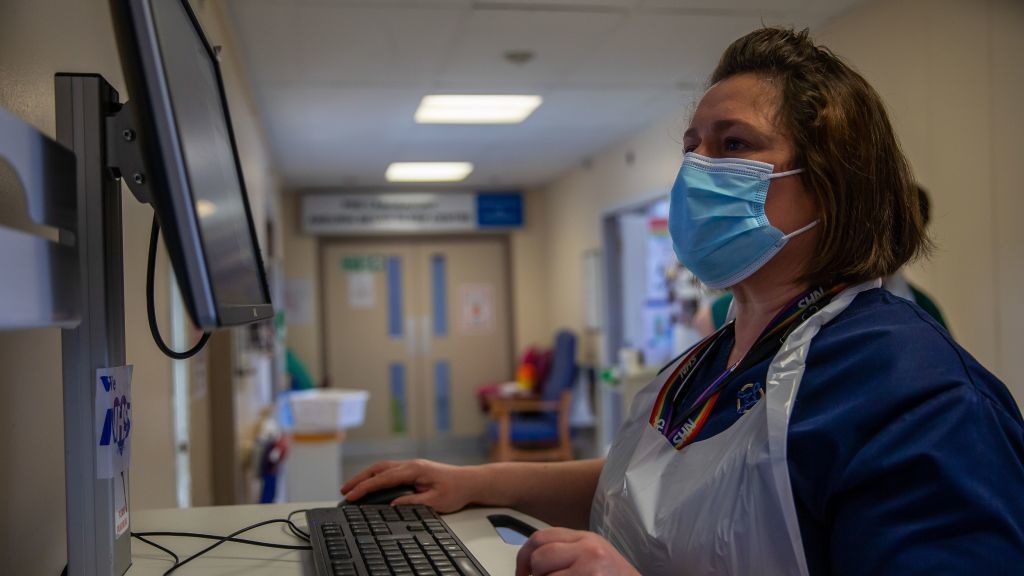Paper-based hospital records linked to thousands of deaths
Study shows hospital death rates fall when nurses log patient data using handheld devices

Mistakes made on paper-based health records could be contributing to thousands of deaths in the UK each year, prompting calls for more hospitals to adopt digital record keeping methods.
Finding from a BMJ Quality & Safety journal report show death rates at two large hospitals fell by 15 per cent when nurses ditched paper records and were given handheld computers instead.
The report authors claim this 15 per cent drop equates to around 750 lives being saved each year at the two testing sites, which in turn could prevent thousands of people dying across the UK.
The devices feature pre-installed software, dubbed VitalPAC, that allows nurses to track the health status of patients and alert users if based on the information the nurse inputs a patient is showing signs of deterioration.
The staff used these devices to record the heart rates, blood pressure, oxygen levels and other vital signs of patients, resulting in fewer mistakes being made on account of poor handwriting and incorrect calculations, it is claimed.
The technology has been trialled at Queen Alexandra Hospital in Portsmouth since 2005, and at the University Hospital in Coventry since 2007.
The researchers said the introduction of the technology which is now being used at 40 hospitals in England led to 400 fewer deaths in one year in Portsmouth and a drop of more than 370 in Coventry.
Sign up today and you will receive a free copy of our Future Focus 2025 report - the leading guidance on AI, cybersecurity and other IT challenges as per 700+ senior executives
Project leader Dr Paul Schmidt of Portsmouth Hospitals NHS Trust said the trial was undertaken because of concerns over the accuracy of paper-based records.
"Observing patients and making accurate records provides a safety net to guard against their deterioration.
"We believed traditional paper charts were not doing the job well enough so we designed an electronic system to support staff. This study shows its introduction was followed by a significant drop in deaths," he added.
Dr Duncan Watson, who worked on the project at University Hospital Coventry, said the technology also frees nurses up so they can spend more time with patients.
"This technology improves the performance of routine but important tasks and frees up clinical staff to do what only human beings can do care for patients."
The study's findings are likely to be welcomed by the UK government, who have already set the NHS a target of becoming paper-free by 2018.
-
 The modern workplace: Standardizing collaboration for the enterprise IT leader
The modern workplace: Standardizing collaboration for the enterprise IT leaderHow Barco ClickShare Hub is redefining the meeting room
-
 Interim CISA chief uploaded sensitive documents to a public version of ChatGPT
Interim CISA chief uploaded sensitive documents to a public version of ChatGPTNews The incident at CISA raises yet more concerns about the rise of ‘shadow AI’ and data protection risks
-
 NHS leaders are keen to adopt new digital tools, but IT can't solve problems on its own
NHS leaders are keen to adopt new digital tools, but IT can't solve problems on its ownA survey of healthcare decision-makers finds they believe IoT devices and electronic health recording could help them reach more patients quicker
-
 How a paperless approach cut wasted staff hours at Bradford Teaching Hospitals Trust
How a paperless approach cut wasted staff hours at Bradford Teaching Hospitals TrustCase study Through DrDoctor’s digital portal for patient appointments and advice, the Rheumatology team at Bradford Teaching Hospitals NHS Foundation Trust has dramatically cut
-
 Healthcare’s next chapter
Healthcare’s next chapterwhitepaper Revolutionizing how you care with EPR experts you can trust
-
 How digital experience management helped an NHS trust improve productivity
How digital experience management helped an NHS trust improve productivityCase study Princess Alexandra Hospital NHS Trust used digital experience management to cut device failure and restore time to clinicians
-
 Will the NHS Federated Data Platform transform UK healthcare?
Will the NHS Federated Data Platform transform UK healthcare?In-depth Plans to create a data platform in partnership with the private sector could revolutionize NHS treatment, but concerns over data privacy and security are festering
-
 NHS IT issues costing doctors more than 13 million hours annually
NHS IT issues costing doctors more than 13 million hours annuallyNews Doctors warn that ageing IT infrastructure is impacting patient care and clinical outcomes
-
 Automation is helping the NHS clear its patient backlog, but not as quickly as expected
Automation is helping the NHS clear its patient backlog, but not as quickly as expectedAnalysis The healthcare service's big bet on robotic process automation is making 'impactful' but slow progress
-
 DHSC sets out ambitious targets for NHS App by 2023, beyond
DHSC sets out ambitious targets for NHS App by 2023, beyondNews Ongoing NHS digitisation efforts will form backbone of the new system